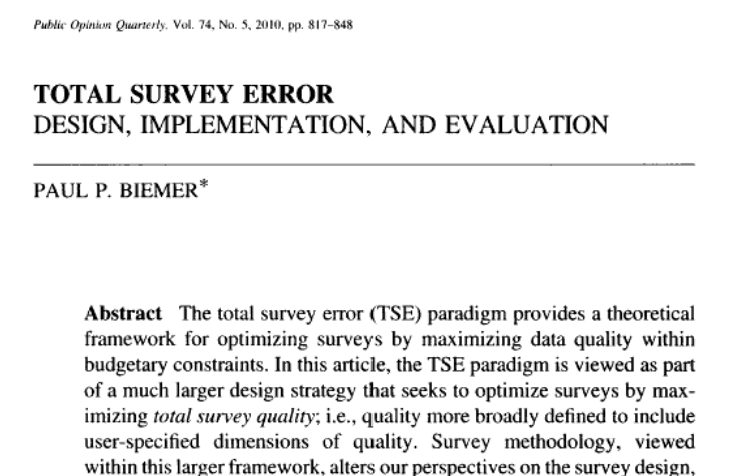
Available Languages:

Available Languages:
Dated: June 2023
Author: Paul P Biemer
Total survey error: design, implementation, and evaluationThe total survey error (TSE) paradigm provides a theoretical framework for optimizing surveys by maximizing data quality within budgetary constraints. In this article, the TSE paradigm is viewed as part of a much larger design strategy that seeks to optimize surveys by maximizing total survey quality; i.e., quality more broadly defined to include user-specified dimensions of quality. Survey methodology, viewed within this larger framework, alters our perspectives on the survey design, implementation, and evaluation. As an example, although a major objective of survey design is to maximize accuracy subject to costs and timeliness constraints, the survey budget must also accommodate additional objectives related to relevance, accessibility, interpretability, comparability, coherence, and completeness that are critical to a survey's "fitness for use." The article considers how the total survey quality approach can be extended beyond survey design to include survey implementation and evaluation. In doing so, the "fitness for use" perspective is shown to influence decisions regarding how to reduce survey error during design implementation and what sources of error should be evaluated in order to assess the survey quality today and to prepare for the surveys of the future.JOURNAL ARTICLETotal survey error: design, implementation, and evaluationPaul P. BiemerThe Public Opinion QuarterlyVol. 74, No. 5, Total Survey Error (2010), pp. 817-848 (32 pages)
The individual components of the trove are listed below. Click on one to download the file or go to the external url. You can download the full trove below as a .zip file.
Total survey error: design, implementation, and evaluation
https://academic.oup.com/poq/article/74/5/817/1815551
No collections available for this resource.
No related resources found.